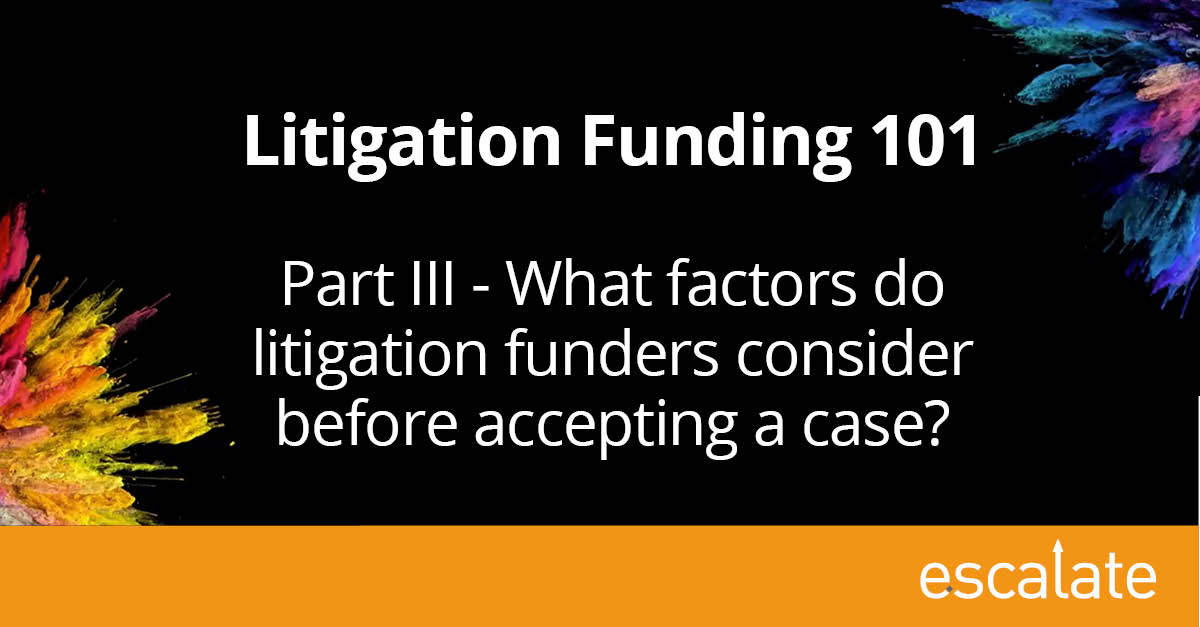If your business is at the start of a commercial dispute, litigation funding is an option you’ve probably considered if you don’t have the means to finance your case. The number of litigation funders and funding options can be overwhelming, however.
There are more specialist litigation funding firms in England than in any other jurisdiction, which makes the business of choosing the right one to represent you a potential minefield – especially if this is your first ever experience of a commercial dispute, and the pressure is on to win your case.
You’ll need to make sure your case qualifies for funding in the first place. But where to start?
This article explains exactly what funders look for when assessing a case to give you an idea of what criteria your dispute needs to meet to be accepted. We’ll also briefly touch on the history of litigation funding, and how its led to the current status quo.
It also completes our litigation funding series, which includes a beginner’s guide to litigation funding, and a look at the pros and cons of funding a dispute.
A short history of litigation financing – it used to be illegal
Litigation funding is otherwise known as third-party financing, whereby an outside firm with no prior connection to the dispute invests money into a litigation case to enable it to proceed.
Historically, it was forbidden for a third party with no legitimate interest or concern in a dispute to fund it, under the rules on ‘champerty’. The practice of champerty involves a third party supporting the litigation in exchange for a share of the settlement funds, and was considered a crime at the start of the twentieth century.
In the aftermath of the Second World War, the law on funding civil litigation was changed. The introduction of legal aid in 1950 brought in state-funded exceptions, and The Criminal Law Act 1967 ended torts of maintenance and champerty from being a crime altogether.
The principles behind these laws were essentially to disallow funders from exerting due influence over a case, which is a regulation that still applies.
Fast forward to the present day, and litigation funding is now specialist area in its own right. In the past 5-10 years the sector has boomed, and Solicitors in England and Wales are now obliged to explain the practice of funding a dispute to their clients. It’s limited to high-value commercial cases only, and not suitable for consumer or personal injury cases.
The Jackson reforms on civil litigation
In 2010, Lord Rupert Jackson carried out a review of civil litigation cases which was designed to increase access to justice and tackle the rising costs of litigation.
The subsequent reforms in 2013 were aimed primarily at personal injury litigation, but also affected commercial litigation. Rules on disclosure changed, court-determined budgets were introduced, claimants were encouraged to make settlement offers, and litigation funding rules were altered.
Though the reforms were well-intended, they may not have achieved their intended goal of creating access to justice for as many SMEs as had been hoped. Since the reforms were introduced, rising court fees, reduced costs recovery, disproportionate insurance and funding premiums, together with a system that is heavily defendant-biased, have created a perfect storm for SMEs.
At a recent roundtable held by the Association of Costs Lawyers (ACL) to mark the 10th anniversary of the introduction of costs management, it was argued that the benefits to the system had yet to be fully delivered, with some litigators still not knowing how much a case is expected to cost.
The new changes to fixed recoverable costs will also have an impact once they come into effect from 1st October 2023. All of these factors means that many businesses are still resigned to writing off viable disputes, and chalking it up to experience.
How litigation funders make decisions about financing disputes
The process of seeking litigation finance requires an individual or company to present their case in a compelling way, legally and tactically. Cases are typically ‘packaged’ for presentation to third-party funders, who then decide whether or not to invest in it.
It’s worth noting that preparation of a case can incur significant costs, which are lost if the funding application is unsuccessful. Most funders won’t pay out for any expenses incurred before a case is accepted by them.
Each funder has its own set of rules and guidelines regarding cases that they’ll accept, but these are the basic requirements that they’ll expect to see when presented with a case.
1. A realistic chance of success
Funders are incentivised to choose cases with a high chance of success, since their return is based on the case winning. Whilst success is never guaranteed, the majority of funders want to be sure that they’re backing a winner.
As a result, they usually take on cases that have already been thoroughly investigated to determine their merits. A solicitor will likely need to carry out a preliminary assessment to establish the strengths and weaknesses of the case, and the more complex a case, the more background work required.
None of this comes cheap, and legal costs can spiral at this stage before anything has been achieved.
Firms typically utilise a percentage score to measure how viable the claim is, and predict its chances of success, and some insurers will insist on a minimum percentage score before agreeing to accept a case.
The scoring system is a slightly subjective and arbitrary method of distilling complex scenarios into a simple number, and can leave some cases right on the threshold of being accepted. It also means multiple parties are involved in decision-making, if an external insurer is being used.
2. Larger claims are generally more well-suited
Funders need to make a decent return on their investment so that they can recover their fees and still make a profit, and each firm will have a minimum case value limit that they’ll accept. This doesn’t mean that smaller claims won’t be approved, however — as the litigation funding market continues to grow, so do the number of opportunities for lower-value cases.
In the past, only claims in the millions were accepted by funders; however this is no longer the case with more players in the market.
For example, Escalate mostly accepts cases from £50,000, but we’re happy to assess lower-value cases too if there’s a compelling reason for it. Even if we can’t help, we’re closely connected to our partner network and will know of another firm that can support you.
3. Does the defendant have the means (and willingness to pay)?
Winning a case is a hollow victory when the losing side refuses to pay up. Or even worse, goes into administration shortly after, which happens more often than you’d think.
Funders will want to know in advance whether a judgement can actually be enforced. To do this, they’ll need to carry out their own checks on the opponent’s financial position and assets, which all adds to the initial outlay when investing in a case.
The more parties involved, the longer this process can take. Especially if investment committees are involved, because the funder isn’t using their own cash reserves and is using outside investment themselves.
Only once a case has been through these hurdles and met the funder’s eligibility criteria will it progress to the next step, and the case is officially engaged.
How Escalate does it differently
It’s easy to see how the decision making that goes into accepting claims can be a complex and long-winded process in itself, before a case has even got off the ground (particularly if outside insurers or investors are involved).
One of the main benefits of using Escalate is that we provide a complete packaged solution – we act as the funder and insurer all in one, which means we’re agile and can make quick decisions.
We work in partnership with you and manage the entire litigation process in-house, so our clients don’t have to worry about third parties or outside interference. Our experienced team of litigators understand the cost/benefit analysis, and are incentivised to resolve your dispute as quickly as possible.
There’s also no need to worry about expensive and time-consuming case packaging costs, or ‘presenting’ your case in a compelling way, as each case is given a free legal assessment before we decide to take it on.
Despite the work that has gone into reforming costs management over the last ten years, most SMEs still have legitimate concerns about how expensive litigation is. Many clients come to us partway through a dispute that has either stalled, or cannot progress, due to lack of funds or inaction on either side.
To counter this, we only charge a capped fee of 30%, which is only payable upon successful recovery, so there are no hidden surprises or unexpected bills at the end. Our all-in-one packaged solution offers legal expertise, case funding and full cost protection against case loss, which guarantees that Escalate clients are always the main beneficiary of any amount awarded.
Whilst litigation funding has opened up more pathways to resolving disputes, we believe the system can work a lot better for SMEs. If you have a dispute that you’d like our help with, please get in touch with our team today.
< News & Views
CONTACT US
Contact Us to find out more about how Escalate can help your business.
Exchange Station, Tithebarn Street, Liverpool,
L2 2QP (Registered office)
London office: 5th floor, 15 Westferry Circus, London, E14 4HD
Escalate Law Limited
Company No: 10381993
Authorised and regulated by the Solicitors Regulation Authority
Escalate Law Limited (No: 650666)

